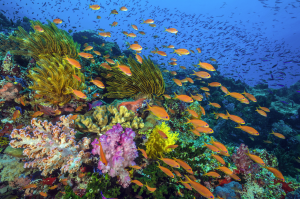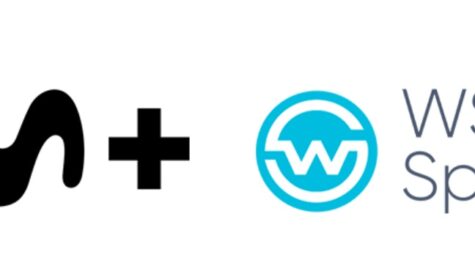BBC and Discovery agree UKTV break-up and ‘biggest ever’ content deal for new SVOD platform

Blue Planet II
The BBC and Discovery have confirmed plans for a break-up of UKTV channels, and unveiled what BBC director general Tony Hall has described as the corporation’s “largest ever content sales deal” as part of a new SVOD offering.
Discovery is to take full control of lifestyle channels including Good Food, Home and Really, while BBC Studios will take the remaining seven channels, including Alibi, Dave, Drama, Eden, Gold, Yesterday and W, alongside digital player UKTV Play and the UKTV brand.
The channels join Discovery’s existing portfolio of 16 channels in the UK, including Discovery Channel, TLC, ID, Animal Planet, Eurosport, Quest and Quest Red and the Quest OD video-on-demand service. Following completion, James Gibbons, EVP and GM for the UK/IRL/ANZ and commercial development for Discovery EMEA, will manage the lifestyle channels as part of Discovery’s UK portfolio.
The BBC has said its seven channels are the “most closely aligned” to its own content strategy and supply, with BBC programmes delivering around half the viewing for these seven channels, and accounting for around 95% of BBC Studios’ content on UKTV today.
Following the changes, the entertainment channels will continue to operate under the UKTV brand out of UKTV’s offices and BBC Studios will look to grow investment into UK programming, including original content, for the channels it will own.
Following completion, Marcus Arthur, president of the UK, Ireland and ANZ for BBC Studios Distribution will also assume the role of CEO for UKTV. Arthur, who joined BBC Worldwide in 1991, previously held the roles of MD of BBC Magazines and MD of global brands and new ventures, and sits on the UKTV Board.
The deal is expected to complete this spring.
BBC Studios’ acquisition of the seven channels comes with a price-tag of £173m, which includes a balancing payment in relation to the channels acquisition and the assumption of £70m of debt, currently financed by Discovery.
Discovery will also receive at least an additional £10m from UKTV, as the parties will share the existing cash on the company’s balance sheet, reflecting outstanding dividend, and other ancillary value transfers to Discovery through the transaction.
BBC Studios and Discovery have also agreed a short-term programme licensing deal for the supply of BBC Studios lifestyle content to Discovery’s UKTV channels in the UK.
David Zaslav, President and CEO of Discovery, said: “As the two market leaders in landmark natural history and iconic factual programming, Tony and I look forward to working together again – our teams represent over 100 years of combined experience. Discovery will be taking that expertise and creating the definitive global streaming product for curious and passionate viewers of all generations who want the most trusted, family friendly storytelling in the world.
“From the planets to the poles, and documenting every species in between, the world has always been part of Discovery’s DNA. It is who we are. Telling these stories is our mission and it is more important now than ever before. The new platform will be the first global direct-to-consumer service with the category’s most iconic IP including the Planet Earth series, future sequels and spin-offs to all existing landmark series, and new exclusive natural history and science programming coming in the future. There is tremendous value in the marketplace for these programming categories which have broad appeal and strong multi-generational engagement, and we hope to fill the void in the global marketplace for a dedicated high-quality product.”
Tony Hall, Director-General of the BBC, added: “The BBC makes outstanding natural history and science programmes. They are ground-breaking and demonstrate the quality and depth of our know-how. It is vital that we keep investing and growing them for the future. This is our largest ever content sales deal. It will mean BBC Studios and Discovery will work together to take our content right across the globe through a new world-beating streaming service. Global subscribers are in for a real treat: the best content on a great new platform.
“This is brilliant news for audiences here as it will enable the BBC to invest even more in factual programming for them. That’s also why BBC Studios taking control of the UKTV channels that best fit our programmes is good news. It means a secure future with long-term commercial returns. The UKTV team has done a fantastic job and I am delighted that will continue.”
The public broadcaster also confirmed that Discovery is to launch a global SVOD service powered by the corporation’s natural history content. Under a 10-year deal, the Discovery-led platform will be populated by the BBC’s existing and future natural history content, including Planet Earth titles and content from other categories spanning science and technology, adventure and exploration, history, space, animals.
The 10-year content deal is effective in all territories outside the UK, Ireland and Greater China, and will make Discovery the exclusive global home of BBC landmark natural history programmes in SVOD, including Planet Earth, Blue Planet and Life. The deal also includes future BBC-commissioned landmark series from BBC Studios, following their linear TX.
Discovery has also acquired SVOD rights to hundreds of hours of other BBC programming across factual genres.
This content will form one of the pillars of the new SVOD service, which will also include some of the best of Discovery’s programming library, original content created for the service, and experiences and offerings that go beyond video.
The service will launch by 2020 and will form a key part of Discovery’s unique and growing portfolio of direct-to-consumer services. These services will also be made available to distribution partners for retail.
Meanwhile, Discovery and BBC Studios have also signed a development deal to create new landmark factual content for Discovery for both linear and digital distribution.
Stuart Thomson writes: Speaking on a conference call on agreement, Hall said he was excited to “reignite our relations with Discovery and David Zaslav”.
He said that people everywhere were increasingly worried about the future of the planet and biodiversity, topics in which the BBC and its natural history unit were experts.
“What we are announcing today is absolutely mission critical,” he said adding that the new SVOD service will enable viewers to see BBC natural history content across the globe.
“This is the biggest content deal the BBC has ever done – £300 million over 10 years. It is important to us financially but also creatively.”
He said the BBC and Discovery had also agreed to invest in content together and hoped to be able to attract new talent to their joint fund for content creation.
The BBC’s involvement is restricted to content supply, said Hall. However, the BBC Studios and Discovery will jointly fund projects in natural history. He said that television now is “about all sorts of content deals” but that the BBC and Discovery were closely aligned for this kind of content.
Hall said that the agreement was not a response to a threat but “comes out of our strength” in natural history.
He said that the BBC’s takeover of UKTV channels reflected the need to secure “future returns for licence fee payers”. He said that the creation of UKTV channels combining some commissions with a lot of BBC library content – representing half of the UKTV schedule – brought in money that could be spent on creating more BBC content.
Hall said the UKTV name would be kept and the BBC would continue to support investment in original content for the channels.
He also said that BBC Studios control of the channels would help open up space for the BBC to realise its ambition to extend the iPlayer window for certain content and also help provide content for its proposed SVOD JV with ITV, BritBox, details of which he expected to be made public soon.
Also speaking on the call, Zaslav said the agreement dated from a meeting between the pair a year ago over dinner. He said the pair’s “joint mission” would make the SVOD service “so powerful”, and that Discovery was reigniting its relationship with the BBC “with a bang”. He said the deal reflected “who we are” as organisations.
Zaslav said the UKTV agreement reflected a clearing up of a lack of clarity about how the IP was split and the future direction of the channels. He said the agreement means that Discovery becomes a ‘top five’ free broadcaster in the UK.
Zaslav said the co-development deal with BBC Studios meant more than the pair’s libraries coming together. “Our ambition is to build on the greatest natural history production in the world” from the BBC and attract more talent and blud chip producers. “We will look to bring other partners in who want to work with us,” he said.
He said that the agreement would cover specials and an annual slate of content. He said the 10-year agreement would create “the definitive streaming product…for curious and passionate viewers”.
He said that the service would cover a large ray of documentary genres. Discovery will be the home of BBC natural history and science catalogues. “These are titles that are loved…in every country in the world.”
The service will develop spin-offs and additional series based on the catalogue, including series produced by the BBC, such as Serengeti, produced by Simon Fuller. and Perfect Planet, produced by Alistair Fothergill.
Zaslav said the service would also include content from Discovery’s “vast vault” of content.
“We see loads of offering of scripted series and movies, but we see natural history as view and do,” he said. Content on the service would be complemented by podcasts and additional content, and opportunities to interact with content creators.
“Natural history is coming back to our core DNA,” he said. “This is a very important piece of our overall strategy.”
Zaslav said that the Netflix brand stood for scripted content and Discovery had a very different brand, which made it a great partners for the BBC.
He said that the service would however “look like a natural history Netflix”.



